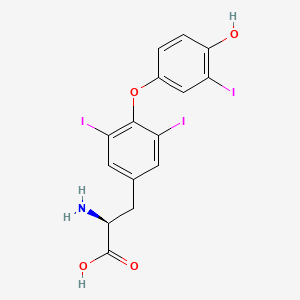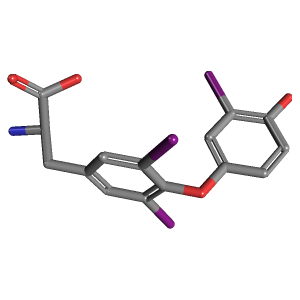Triiodothyronine Information
Click here to view all Triiodothyronine productsThe information, including but not limited to, text, graphics, images and other material contained on this website are for informational purposes only. No material on this site is intended to be a substitute for the consultation, diagnosis, and/or medical treatment of a qualified physician or healthcare provider.


Triiodothyronine (T3) is a hormone produced by the thyroid gland. It is one of the two main thyroid hormones, along with thyroxine (T4). T3 is derived from T4 through the removal of one iodine atom.
T3 plays a crucial role in regulating various physiological processes in the body, including metabolism, growth, and development. It acts on almost every cell in the body and influences the function of organs such as the heart, brain, liver, and kidneys.
The primary mechanism of action of T3 is through binding to nuclear receptors in the target cells. Once inside the cell, T3 binds to specific receptors called thyroid hormone receptors (TRs) located in the nucleus. This binding activates the TRs, leading to the transcription of specific genes and subsequent protein synthesis.
T3 increases the basal metabolic rate, which affects the body's energy production and consumption. It stimulates the breakdown of glucose and fatty acids for energy, increases oxygen consumption, and enhances heat production (thermogenesis). T3 also promotes protein synthesis and growth, particularly in children.
In addition to its metabolic effects, T3 influences the cardiovascular system by increasing heart rate and cardiac output. It also affects the central nervous system, playing a role in mood regulation, cognition, and memory.
Overall, Triiodothyronine is a vital hormone that regulates numerous physiological processes in the body, ensuring proper metabolism, growth, and development.
Synonyms of Triiodothyronine
- liothyronine
- triiodothyronine
- 3,3',5-Triiodo-L-thyronine
- 6893-02-3
- Tresitope
- Liothyronin
- 3,5,3'-triiodothyronine
- L-Liothyronine
- O-(4-Hydroxy-3-iodophenyl)-3,5-diiodo-L-tyrosine
- T3
- 3,5,3'-Triiodo-L-thyronine
- triothyrone
- Liothyroninum
- Lyothyronine
- Liotironina
- L-T3
- L-3,3',5-TriioDOThyronine
- Triiodo-L-thyronine
- 3,3',5-Triiodothyronine
- 3,5,3'TRIIODOTHYRONINE
- Cyronine
- L-3,5,3'-Triiodothyronine
- T3 (amino acid)
- (2S)-2-amino-3-[4-(4-hydroxy-3-iodophenoxy)-3,5-diiodophenyl]propanoic acid
- (S)-2-amino-3-(4-(4-hydroxy-3-iodophenoxy)-3,5-diiodophenyl)propanoic acid
- L-Tyrosine, O-(4-hydroxy-3-iodophenyl)-3,5-diiodo-
- C15H12I3NO4
- Liothyronine [INN:BAN]
- Euthroid-1
- Euthroid-2
- Euthroid-3
- Thyrolar-1
- Thyrolar-2
- Thyrolar-3
- Liotironina [INN-Spanish]
- Tri-Thyrotope
- Euthroid-0.5
- Thyrolar-0.5
- Liothyronine (GMP)
- Liothyronine (INN)
- Rathyronine, (s)-
- T3 (VAN)
- Triiodothyronine, l-
- Thyrolar-0.25
- 3,5,3'-Tri-iodo-L-thyronine
- CHEBI:18258
- T3 (Triiodothyronine)
- Triiodothyronine (T3)
- Triomet-131
- Thyronine, 3,3',5-triiodo-, L-
- Liothyroninum [INN-Latin]
- CHEMBL1544
- 4-(4-Hydroxy-3-iodophenoxy)-3,5-diiodophenylalanine
- 06LU7C9H1V
- 4-(4-hydroxy-3-iodophenoxy)-3,5-diiodo-L-phenylalanine
- 3,5,3'-triiodothyronine, l-
- DTXSID8023216
- 3,3',5-Triiodothyronine, L-
- HSDB 3110
- Alanine, 3-(4-(4-hydroxy-3-iodophenoxy)-3,5-diiodophenyl)-, L-
- EINECS 229-999-3
- MFCD00002593
- NSC 80203
- NSC-80203
- 4-(3-Iodo-4-hydroxyphenoxy)-3,5-diiodophenylalanine
- BRN 2710227
- L-triiodothyronine
- L-3-(4-(4-Hydroxy-3-iodophenoxy)-3,5-diiodophenyl)alanine
- Cytomel (TN)
- LIOTHYRONINE [INN]
- O-(4-Hydroxy-3-iodophenyl-3,5-diiodo-L-tyrosine
- DTXCID403216
- T3 (LIOTRIX)
- TRIIODOTHYRONINE (T3 OR LIOTHYRONINE, ACTIVE) (6-11%)
- T3 liothyronine
- (+)-Triiodothyronine
- C15-H12-I3-N-O4
- T-3
- CAS-6893-02-3
- Rathyronine [DCF:INN]
- C15-H12-(sup 131)I3-N-O4
- SR-05000000455
- 5714-08-9
- 3,3',5-Triiodo-D-thyronine
- NSC-46046
- 1xzx
- (2S)-2-AMINO-3-(4-(4-HYDROXY-3-IODOPHENOXY)-3,5-DIIODOPHENYL)PROPANOIC ACID
- Tertroxin (TN)
- Prestwick_135
- L-Tyrosine, O-(4-hydroxy-3-iodophenyl)-3,5-diiodo-, labeled withiodine-131
- Spectrum_001445
- Triiodothyronine;3,3',5-Triiodo-L-thyronine;T3
- Prestwick0_000853
- Prestwick1_000853
- Prestwick2_000853
- Prestwick3_000853
- Spectrum2_001984
- Spectrum3_001887
- Spectrum4_000326
- Spectrum5_001793
- LIOTHYRONINE [MI]
- Liothyroninum[INN-Latin]
- D0D8QI
- D0S6JG
- Epitope ID:131324
- LIOTHYRONINE [HSDB]
- SCHEMBL8300
- NCIStruc1_000449
- LIOTHYRONINE [VANDF]
- UNII-06LU7C9H1V
- REGID_for_CID_5920
- BSPBio_000865
- BSPBio_003394
- KBioGR_000671
- KBioGR_002568
- KBioSS_001925
- KBioSS_002577
- 3,3'5-Triiodo-L-thyronine
- MLS000028458
- 3,5,3'-triodo-L-thyronine
- LIOTHYRONINE [USP-RS]
- LIOTHYRONINE [WHO-DD]
- SPBio_002167
- SPBio_002786
- BPBio1_000953
- GTPL2634
- HY-A0070AG
- L-3,3',5-triiodo-Thyronine
- 3,3',5-Trichloro-L-thyromine
- 3,3\',5-triiodo-L-thyronine
- BCBcMAP01_000192
- BDBM18860
- HY-A0070A
- KBio2_001925
- KBio2_002568
- KBio2_004493
- KBio2_005136
- KBio2_007061
- KBio2_007704
- KBio3_002897
- KBio3_003046
- cMAP_000088
- HMS1570L07
- HMS2097L07
- HMS2235A22
- HMS3714L07
- LIOTHYRONINE [USP IMPURITY]
- Tox21_110029
- Tox21_301943
- HB7470
- NCGC00013556
- s5726
- 3,5,3'-triiodo-L-thyronine (T3)
- (S)-2-Amino-3-(4-(4-hydroxy-3-iodophenoxy)-3,5-diiodophenyl)propanoicacid
- AKOS016003266
- 3,3',5-Triiodo-L-thyronine, 95%
- AM83597
- CCG-220853
- CS-4141
- CS-O-31028
- DB00279
- L-3,3',5-Triiodothyronine, free acid
- SMP1_000179
- NCGC00013556-01
- NCGC00013556-02
- NCGC00013556-03
- NCGC00013556-04
- NCGC00013556-05
- NCGC00013556-15
- NCGC00096669-01
- NCGC00096669-02
- NCGC00255336-01
- [125I]T3
- AC-31935
- AS-17446
- LS-16137
- SMR000058402
- SBI-0206718.P001
- Thyronine, 3,3',5-triiodo-, L-(6CI)
- CS-0622788
- T0453
- C02465
- D08128
- EN300-123970
- A836290
- Q327362
- SR-01000003143
- SR-01000003143-4
- SR-05000000455-2
- SR-05000000455-3
- 3,3 inverted exclamation mark ,5-Triiodo-L-thyronine
- BRD-K89152108-001-03-3
- LEVOTHYROXINE SODIUM IMPURITY A [EP IMPURITY]
- 3,3',5-Triiodo-L-thyronine, >=95% (HPLC), powder
- Z1557400301
- L-Tyrosine, O-(4-hydroxy-3-iodophenyl)-3,5-diiodo-(9CI)
- D-3-[4-(4-hydroxy-3-iodophenoxy)-3,5-diiodophenyl]alanine
- L-3-[4-(4-hydroxy-3-iodophenoxy)-3,5-diiodophenyl]-Alanine
- Liothyronine, United States Pharmacopeia (USP) Reference Standard
- 3,3',5 Triiodothyronine (T3), IRMM(R) certified Reference Material
- O-(4-Hydroxy-3-iodophenyl)-3,5-diiodo-L-tyrosine,labeled with(125i)iodine
- Liothyronine, Pharmaceutical Secondary Standard; Certified Reference Material

